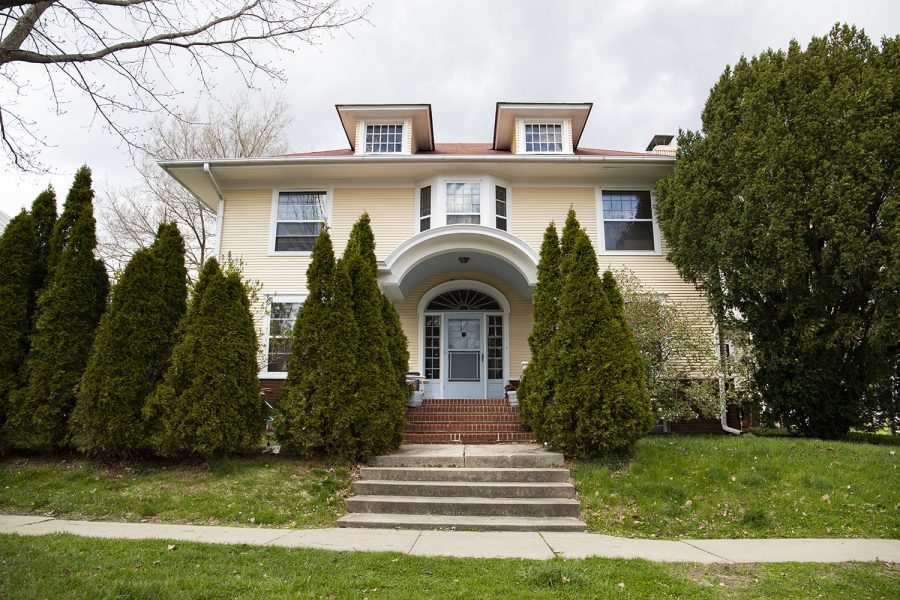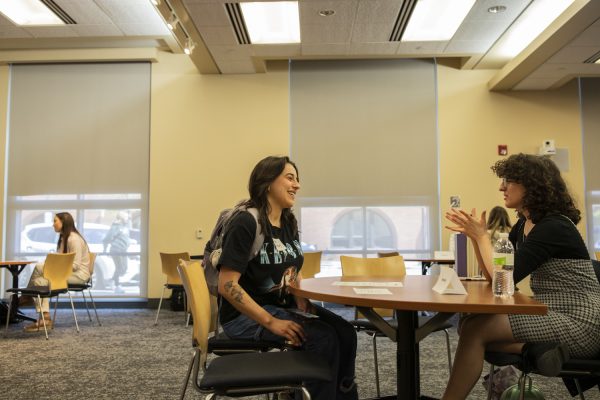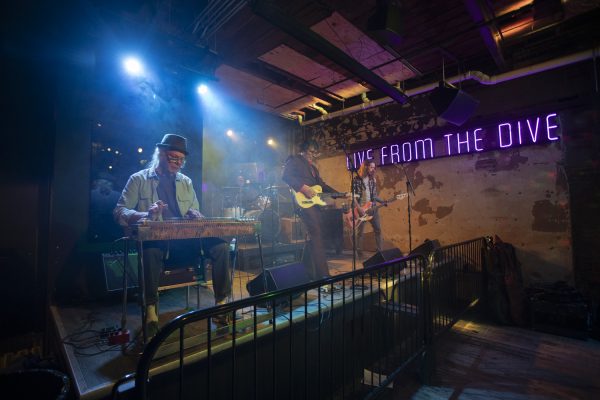After five years, the Iowa Writers’ House, a haven and home for creatives, is closing its doors
The Iowa Writers’ House is officially leaving its location on Davenport Street and taking a break until further notice as COVID-19 takes a toll on its already-persistent financial struggles.
The Iowa Writers’ House is seen on April 20, 2020. The building closed this week due to the novel coronavirus. (Jenna Galligan/The Daily Iowan)
April 20, 2020
Iowa Writers’ House founder and Executive Director Andrea Wilson penned a lengthy Facebook post on April 14, stating that after five years at its historic Davenport Street location, the “little organization with a big heart” will leave its home and go on hiatus indefinitely.
The temporary closure comes in part as a result of the catastrophic impact COVID-19 has had on the Iowa City arts community, prompting the cancellation or postponement of much of the local arts programming, including Englert Theater’s Mission Creek Festival and the remainder of Hancher’s spring season.
But Wilson said the nonprofit has never been able to secure stable funding.
“We’ve always been a bootstrap, grassroots organization,” Wilson said. “We didn’t have major funding sources, so it was the energy and will of the team and I that kept the organization going. [COVID-19] is a major factor, but we were always aware that in order for the organization to survive, we would need a partnership or greater support from community or city infrastructure, and in five years, we haven’t been able to secure that.”
Wilson built the Iowa Writers’ House organization from the ground up in 2015, hoping to create a home for writers to gather and share their work. According to the Iowa Writers’ House website, the Iowa City UNESCO City of Literature was in need of a place for the community to grow.
Iowa City of Literature Executive Director John Kenyon echoed this sentiment, stating that the writing community in Iowa City can tend to be centered primarily around the University of Iowa.
“If you’re not affiliated with the university, sometimes it can be a challenge to find ways to plug in,” Kenyon said. “[The Iowa Writers’ House was] able to provide a sense of community, to get people together who maybe weren’t a part of that world but wanted to take advantage of it, to learn more about writing and share their writing with others.”
Despite the closure, some of the Iowa Writers’ House’s programs are planned to continue.
The Bicultural Iowa Writers Fellowship has persisted through the pandemic and will publish its third volume of We the Interwoven later this year, accompanied by a curriculum to be taught in schools. The publication will feature six multicultural stories of living in Iowa. Wilson said she hopes that it can be used as an educational tool to help create understanding the immigrant experience.
RELATED: Iowa Writers’ House celebrates second issue of We the Interwoven
In addition, the Writers’ Room, which began in the Writers’ Houses as a space to work on genre fiction or poetry, is continuing to meet via video-conference tools Zoom or Google Hangouts, and Facebook groups.
Erin Casey, the director of this program, said anyone can learn more by visiting its website or Facebook.
Casey, who is also the student relationships manager at the Iowa Writers’ House, fondly recalled the broad impact the organization has had on visitors.
“It’s a place where people can come and find their voices… It gave people a place to call home,” she said.
In her Facebook post, Wilson wrote that the Iowa Writers’ House must evolve in order to continue as it has. Online options are being considered, Wilson said, though this may be difficult given the organization’s reliance on in-person meetings and workshops.
For now, the future of the Iowa Writers’ House is unclear, though the volunteers at the Iowa Writers’ House want to assure local writers that they aren’t alone and will continue to find ways to keep creating.
“It could involve being less tied to a specific space, and thinking of the house as more of a concept than a specific physical address,” Iowa Writers’ House Assistant Director Alisha Jeddeloh said.













